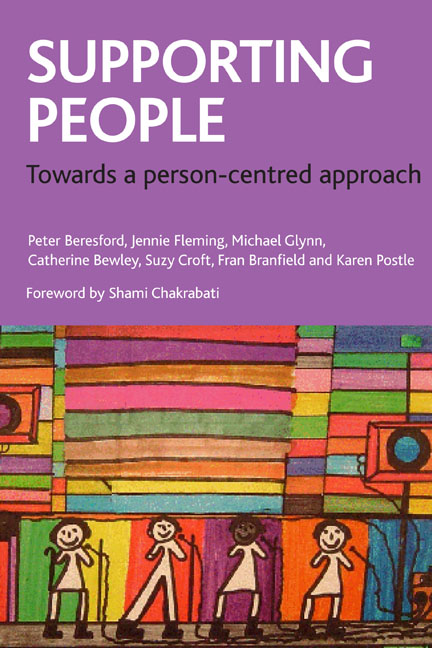Book contents
- Frontmatter
- Dedication
- Contents
- About the authors
- Acknowledgements
- Foreword
- Introduction
- Part One The Background to Person-Centred Support
- Part Two Person-Centred Support: Barriers and Ways of Overcoming Them
- Part Three Broader Issues for Person-Centred Support
- Part Four Making Change to Achieve Person-Centred Support
- Appendices
ten - Capacity-building for support
Published online by Cambridge University Press: 01 September 2022
- Frontmatter
- Dedication
- Contents
- About the authors
- Acknowledgements
- Foreword
- Introduction
- Part One The Background to Person-Centred Support
- Part Two Person-Centred Support: Barriers and Ways of Overcoming Them
- Part Three Broader Issues for Person-Centred Support
- Part Four Making Change to Achieve Person-Centred Support
- Appendices
Summary
There may be some difficult questions we have not engaged with about how we deliver effectively for everyone. There is inequality in the system now. How do we get the balance right?
(David Morris, Senior Policy Adviser to the Mayor of London [Disability and Deaf equality], quoted in Beresford, 2009, p 16)‘We must have someone to go to when it goes wrong – because our life depends on it – even when we are living independently. We are vulnerable even if we don't want to be.’
(Service user, quoted in Beresford, 2009, p 28)Standard Nine: Ensuring an infrastructure of support
An infrastructure of support is essential if everybody is to be able to access person-centred support, including personal budgets and other forms of self-directed support on equal terms, regardless of their access or support needs, their culture or diversity. This requires the provision of high quality, reliable and independent advice, guidance, information, capacity-building and advocacy.
Introduction
We saw in Chapter Eight how members of black and minority ethnic communities were often isolated from support and mainstream services. But while they face particular barriers, the difficulties all service users face in getting the support they need seems to be a much broader problem. Again it has much to do with the way that services work and their lack of fit with service users’ lives and experience. In this chapter we look in more detail at these difficulties and how they may be overcome, particularly through supporting people to be in a stronger position as service users to engage with services and support systems. Issues of capacity building are key here.
Whatever system of support is available to ensure people can live as independently as possible, the first requirement is that it is readily available and accessible to them. This is no less true if the ambition is to move on from traditional approaches, to provide person-centred support. Indeed it may be that the need is even greater with person-centred support.
What distinguishes person-centred support from traditional serviceled approaches to social care and social services is that it is essentially an interactive process.
Information
- Type
- Chapter
- Information
- Supporting PeopleTowards a Person-Centred Approach, pp. 269 - 284Publisher: Bristol University PressPrint publication year: 2011
